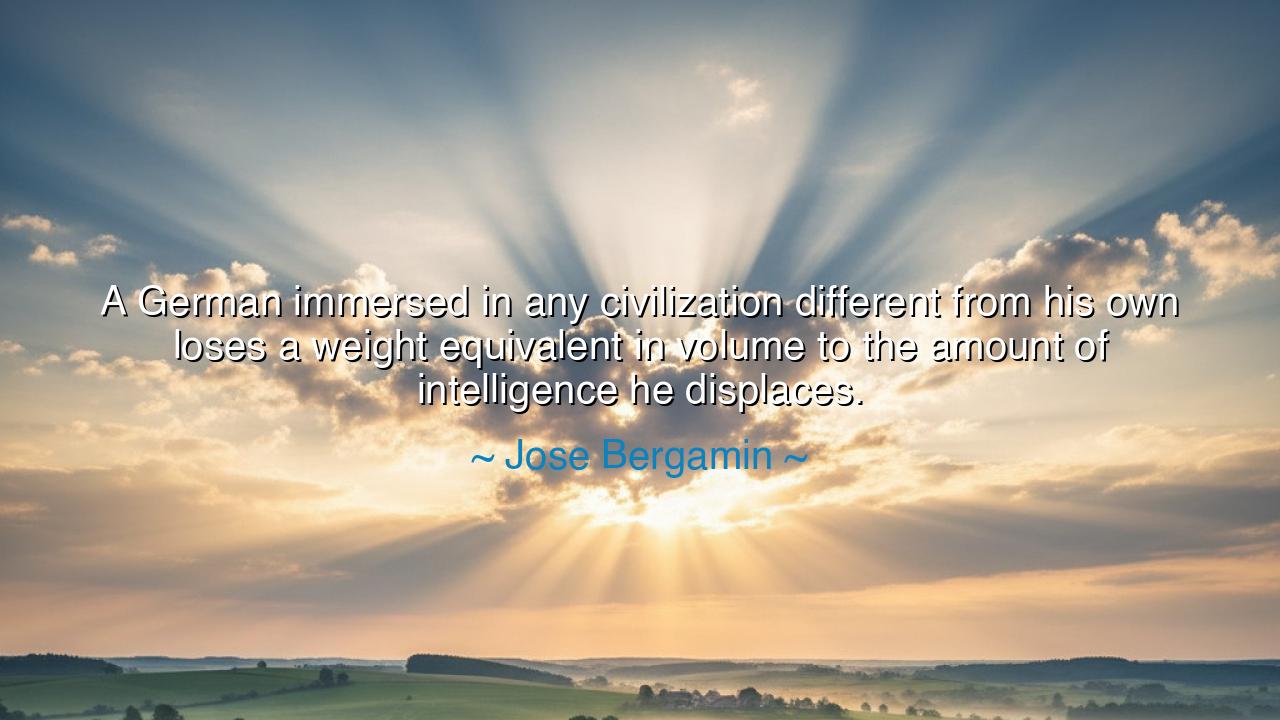
A German immersed in any civilization different from his own
A German immersed in any civilization different from his own loses a weight equivalent in volume to the amount of intelligence he displaces.






The words of José Bergamín, “A German immersed in any civilization different from his own loses a weight equivalent in volume to the amount of intelligence he displaces,” are not easily grasped at first glance. They shimmer with irony, intellect, and a hint of mischief, as many of Bergamín’s writings do. Yet beneath the wry tone lies a deep meditation on identity, culture, and the fragile balance between intellect and belonging. He speaks not only of the German, but of all peoples who, when uprooted from their native soil, risk losing that inner harmony between mind and spirit that binds them to their civilization. The quote warns of what happens when one’s intelligence is divorced from one’s cultural essence, when learning forgets its roots, and when reason stands unanchored in the winds of alien worlds.
To understand the origin of this statement, we must enter the mind of Bergamín himself—an essayist, poet, and philosopher of early twentieth-century Spain, a man who lived through civil war, exile, and the collapse of old European ideals. He was a thinker who loved paradox, who used humor as a vessel for truth. His comment about the “German” must be read through this lens—not as prejudice, but as reflection on a particular cultural temperament. To Bergamín, the German spirit symbolized rigorous intellect, discipline, and idealism, traits embodied by great minds such as Goethe, Kant, and Beethoven. But he saw, too, the danger of such intellect when it became detached from moral and spiritual grounding. The “weight” that is lost, he implies, is not physical but moral—the ballast of the soul that keeps intelligence from floating aimlessly into abstraction or arrogance when separated from its native conscience.
This idea carries the echo of an ancient truth: that every civilization shapes the character of its people, just as the potter shapes clay. To step into another culture is not merely to change scenery, but to enter a different rhythm of life, a different way of knowing and feeling. Some thrive in this transformation, drawing strength from diversity; others, however, become unmoored. Bergamín’s German, transplanted from his homeland, loses not his knowledge but his measure—the harmony between thought and heart that his civilization had nurtured. Thus, what he displaces is not intelligence itself, but wisdom, the higher order that gives intelligence its direction.
History offers many examples of this truth. Consider the story of Nietzsche, a man whose mind sought to transcend all boundaries of nation and belief. Though he was German by birth, his intellect wandered beyond all cultures, seeking a universal truth unbound by tradition. Yet in that boundless pursuit, Nietzsche’s brilliance consumed itself; detached from faith and community, his genius turned inward, fracturing under the weight of its own fire. He gained infinite freedom but lost equilibrium—his intelligence displaced by the very vastness he sought to master. Bergamín, perhaps, would have seen in Nietzsche the tragic image of the brilliant exile, who in leaving the ground of his civilization, loses the gravity that kept his intellect humane.
And yet, this quote can also be seen as a meditation on exile and belonging, for Bergamín himself lived much of his life far from Spain. He knew the ache of displacement—the sense that one’s mind, though intact, floats strangely when torn from its cultural soil. He recognized that civilization is not only an external system of laws and art, but an inner rhythm—a harmony of thought, language, and spirit that gives the mind its stability. When a person leaves that harmony behind, they may gain knowledge of other lands, but something in their inner architecture shifts. The balance between intellect and instinct, between knowing and being, becomes fragile. Intelligence expands outward but loses its depth.
Yet, Bergamín’s warning is not a condemnation of travel or cultural exchange. It is, rather, a call to rooted wisdom—to remember that the mind, like a tree, must draw nourishment from its own soil even as its branches reach toward new skies. The lesson is not to fear immersion in other civilizations, but to carry one’s essence intact—to learn without losing oneself, to think freely without forgetting where one’s thoughts were born. For the danger he speaks of is not limited to the German, nor to any nation, but to every mind that mistakes cleverness for wisdom, and universality for the abandonment of self.
So let us take from Bergamín’s words a quiet but powerful teaching: true intelligence is not measured by brilliance alone, but by harmony. A mind divorced from its heart, a thinker without cultural or moral anchor, becomes hollow, weightless, and cold. To grow wiser, one must both expand and remain rooted—like a river that widens as it flows, yet always draws from its source. Travel, learn, immerse yourself in new worlds, but do not lose the melody of your own. For the soul that forgets its origin, however intelligent it becomes, drifts like a star that has lost its orbit—bright, but without a sky to call home.
Thus, Bergamín’s enigmatic line endures as both warning and wisdom. He reminds us that intelligence, when severed from identity, can become arrogance; but when joined with humility and rootedness, it becomes enlightenment. The task of every generation, then, is not merely to think, but to remember—to let knowledge grow without displacing the intelligence of the heart. For civilization advances not through brilliance alone, but through the marriage of intellect and belonging, of thought and soul, of mind and home.






AAdministratorAdministrator
Welcome, honored guests. Please leave a comment, we will respond soon